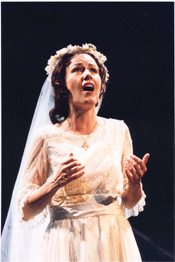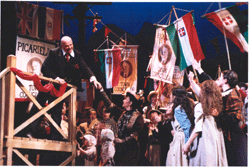Canadian Theatre Encyclopedia
Filumena

Banff Centre production, August 2003
Photo courtesy of the Banff Centre
The opera, Filumena, with music by John Estacio and libretto by John Murrell, premiered in Calgary in January 2003, and was remounted at the Banff Centre in August 2003. It is set in the coalmining town of Blairmore Alberta between 1915 and 1923, and tells the story of Filumena Lassandro, the only woman to be hanged in Alberta. She was executed at the Fort Saskatchewan penitentiary near Edmonton in 1923 at the age of 22, for the murder of a provincial police constable. Her purported accomplice, Emilio Picariello, was also hanged.

Banff Centre production, August 2003
Photo courtesy of the Banff Centre
Filumena’s family immigrated to British Columbia from Italy, and her life was circumscribed by social and religious strictures in her new home, as in her old. At the age of fourteen she was married to a man ten years her senior. Emilio Picariello emigrated to the United States from southern Italy at the turn of the last century at the age of twenty-five. He moved to Toronto where he married, and then to Fernie B.C. in 1911, where he operated a confectionary and cigar business, and built a successful ice cream company. He was ambitious and charming, a large and generous man who distributed food to miners’ families during strikes. And he knew how to prosper in difficult times, establishing a legal liquor business in 1914, and an illegal one after 1915 when Prohibition legislation was enacted in Alberta. Because he collected used bottles that he sold to the Alberta government, he became known as the “bottle king,” Emperor Pic. He moved to Blairmore where he purchased a hotel, and in 1921 he was elected to the town council. Emilio sold 2 ˝% temperance beer, but also ran liquor across the border from B.C. and into the U.S. in large fast McLaughlin cars, dubbed “Whiskey Sixes.”
In 1917 Carlo and Filumena Lassandro moved to Blairmore and lived in rooms on the second floor of the Alberta Hotel. Charles worked for Emilio, assisting in the transportation of illegal alcohol with Emilio’s son, Steve. Filumena helped with the housekeeping and the care of Emilio’s children. She was also persuaded by Emilio to accompany Steve on trips to the U.S., since the police would be unlikely to suspect a young couple out for a car ride. Whether or not a relationship developed between the pair is conjectural, as is the nature of the relationship between Filumena and Emilio, but both provided ample material for the press when Steve was wounded by a provincial constable, who was subsequently shot when Emilio and Filumena went to his home, believing he had murdered Steve. Both were accused of murder, but Emilio tried to persuade Filumena to take the blame, as he believed that a woman wouldn’t be hung in Canada. The Canadian Press reported that Filumena “displayed the greatest fortitude” before her execution, but continued to protest her innocence.
Librettist John Murrell collaborating with composer John Estacio, performs the “passion and pathos” of the “exceptional true life-story” (Program Note) of the last woman to be hanged for murder in Canada in the context of an Italian community energized by hope for a new life in Canada, and compromised by bigotry. This community is under the generous and benevolent rule of Emilio Picariello, into whose orbit the naďve young wife, Filumena, is drawn. The opera begins with her wedding celebration and a vibrant Italian tarantella. Her father hands her over to her older husband with the admonition:
To this husband that I found you! Always cherish and obey him! Never mock him or betray him! Always honour and respect him! Never scold him or neglect him!
A chorus of wedding guests echoes this sermon in Italian. Filumena is firmly placed within the strictures of a traditional Italian community, transplanted to Canada. However, already she is beginning to resist this role, and moves away from the other women to stare at the overcast sky and mountains, gesturing towards her freedom and foreshadowing its termination in death. Murrell resists casting Filumena wholly as a victim. He discovers in the character “a dreamer, capable of enchantment and also of enchanting, a person capable of extraordinary happiness, someone who dreams of improving her lot in life. Someone attuned to the majestic power of the landscape.” The line, “We will live like this forever,” recurs in the opera. As Murrell has explained, “That’s the dream that raises them above the everyday struggle. It’s in all my work, whether the characters are Prairie prostitutes or great artists, creative dissatisfaction with their worlds.”
Her husband, Charlie, also attempts to control her by renaming her “Florence” – an English name that denies her history -- and by insisting that she speak only English. She resists his authority, and promises her mother that she will always keep her own name in her heart. The opera traces her awakening to love and hope for a new life in a new land through her relationship with Emilio’s son, and her growing independence and confidence. But she is also seduced by Emilio’s promise that they will all lead a good clean life once they have enough money to fulfill their dreams:
Filumena’s role in the murder of Constable Lawson is performed as accidental. But the response of the Anglo public is virulent:
Since they came here, the streets aren’t safe! They spit on both law and order! Send them back home, that’s what I say! Or, at least, south of the border!
The Italian community responds by calling the English hypocrites and liars.
Emilio attempts to shift the blame to Filumena, and even Steve tries to persuade her to accept the responsibility and save his father, but Filumena insists on telling her own truth, and faces her death with courage. Her final aria, “I love a storm,” expresses her irrepressible yearning for freedom:
There will be a storm tonight … I loved a storm! When there was nowhere safe in sight … and nowhere warm! I could have run to somewhere safe, free from all harm – But I loved a storm!
A storm to lift the heart, A storm that’s just for me. Come, storm, and let me fly. Come, death, and set me free.
Filumena is a fusion of words and music, as Murrell emphasizes in a program note. Although he had been intrigued for a decade by the possibilities of the story he discovered in The Rum Runners, he could not make it work as a play. Opera is an appropriate form to convey a love story that is “highly coloured, richly textured, which [has] both …subtlety and the passion.” “Music alone or words alone cannot impart the infinite subtlety of the human mind, in the very same instant when our hearts are expanding to contain eternal passions.” The story, yoked to the music, becomes a vehicle for the expression of powerful human emotions. It participates in the tradition of Italian tragic opera.
Anne Nothof, Athabasca University
Last updated 2009-04-01

